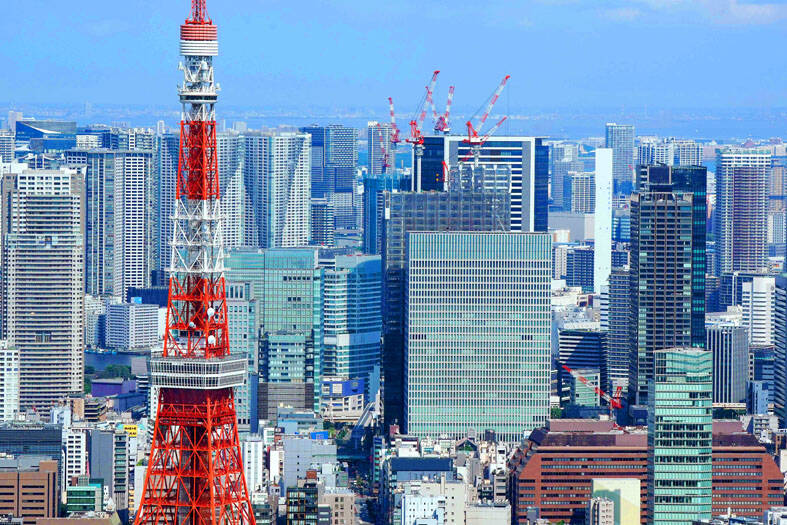Japan’s economy expanded faster than expected last quarter, led by solid domestic demand, boosting the case for the Bank of Japan (BOJ) to raise its benchmark rate again this year while giving embattled Japanese Prime Minister Shigeru Ishiba some rare good news.
Gross domestic product grew at an annualized pace of 1 percent in the three months through June from the prior period, surpassing economists’ forecast of a 0.4 percent gain, the Japanese Cabinet Office reported yesterday.
Authorities revised the previous quarter’s results to 0.6 percent growth, reversing from a preliminary contraction.

Photo: AFP
Gains were led by business investment, which rose 1.3 percent from the previous quarter, surpassing the consensus estimate of 0.7 percent growth. Private consumption nudged 0.2 percent higher.
Signs of stronger-than-expected resilience in the economy would likely encourage views that the central bank would hike again this year. While the BOJ is expected to hold steady when it next sets policy on Sept. 19, some 42 percent of economists surveyed by Bloomberg anticipate a move in October. BOJ Governor Kazuo Ueda last month said that authorities would keep raising borrowing costs if they are confident domestic demand could stay steady.
“I had been expecting a rate hike in October, and I feel like the chances of that have gone up a bit,” said Atsushi Takeda, chief economist at Itochu Research Institute. “The market consensus also seems to be shifting toward an earlier hike now.”
“Japan’s surprisingly strong second-quarter GDP bolsters the Bank of Japan’s case for a near-term rate hike, providing evidence that domestic demand is holding firm despite higher US tariffs,” Bloomberg economist Taro Kimura said.
Yesterday’s GDP figures are the first to reflect the impact of US President Donald Trump’s tariffs and auto levies, which took effect in April. During the period, Japan faced a 10 percent baseline tariff along with 25 percent levies on cars. A 25 percent tax on US steel imports introduced in March was doubled in early June.
“Even amid all the uncertainty surrounding US tariffs, business investment has also been growing steadily,” said Hiromu Komiya, economist at the Japan Research Institute.
Ishiba’s administration has said the car levies would be set at 15 percent, the same as the current baseline rate, once Washington adjusts executive orders in line with an agreement reached late last month.
Earlier this month the government cut its real growth projection for this fiscal year to 0.7 percent from a previous forecast of 1.2 percent. The downgrade partly reflected a darkening global economic outlook resulting from Trump’s trade policies.
Against that backdrop, the economy’s show of resilience in the April-June period would provide some political relief for Ishiba, whose ruling coalition lost its majority in the upper house in last month’s election partly due to widespread frustration over the persistent rise in costs of living.
The third quarter might reflect a bigger impact from tariffs now that front-loading has stopped. Other risks to growth include persistent inflation, with data due next week expected to show consumer price growth remained well above the BOJ’s target last month.

PERSISTENT RUMORS: Nvidia’s CEO said the firm is not in talks to sell AI chips to China, but he would welcome a change in US policy barring the activity Nvidia Corp CEO Jensen Huang (黃仁勳) said his company is not in discussions to sell its Blackwell artificial intelligence (AI) chips to Chinese firms, waving off speculation it is trying to engineer a return to the world’s largest semiconductor market. Huang, who arrived in Taiwan yesterday ahead of meetings with longtime partner Taiwan Semiconductor Manufacturing Co (TSMC, 台積電), took the opportunity to clarify recent comments about the US-China AI race. The Nvidia head caused a stir in an interview this week with the Financial Times, in which he was quoted as saying “China will win” the AI race. Huang yesterday said

Nissan Motor Co has agreed to sell its global headquarters in Yokohama for ¥97 billion (US$630 million) to a group sponsored by Taiwanese autoparts maker Minth Group (敏實集團), as the struggling automaker seeks to shore up its financial position. The acquisition is led by a special purchase company managed by KJR Management Ltd, a Japanese real-estate unit of private equity giant KKR & Co, people familiar with the matter said. KJR said it would act as asset manager together with Mizuho Real Estate Management Co. Nissan is undergoing a broad cost-cutting campaign by eliminating jobs and shuttering plants as it grapples

The Chinese government has issued guidance requiring new data center projects that have received any state funds to only use domestically made artificial intelligence (AI) chips, two sources familiar with the matter told Reuters. In recent weeks, Chinese regulatory authorities have ordered such data centers that are less than 30 percent complete to remove all installed foreign chips, or cancel plans to purchase them, while projects in a more advanced stage would be decided on a case-by-case basis, the sources said. The move could represent one of China’s most aggressive steps yet to eliminate foreign technology from its critical infrastructure amid a

MORE WEIGHT: The national weighting was raised in one index while holding steady in two others, while several companies rose or fell in prominence MSCI Inc, a global index provider, has raised Taiwan’s weighting in one of its major indices and left the country’s weighting unchanged in two other indices after a regular index review. In a statement released on Thursday, MSCI said it has upgraded Taiwan’s weighting in the MSCI All-Country World Index by 0.02 percentage points to 2.25 percent, while maintaining the weighting in the MSCI Emerging Markets Index, the most closely watched by foreign institutional investors, at 20.46 percent. Additionally, the index provider has left Taiwan’s weighting in the MSCI All-Country Asia ex-Japan Index unchanged at 23.15 percent. The latest index adjustments are to